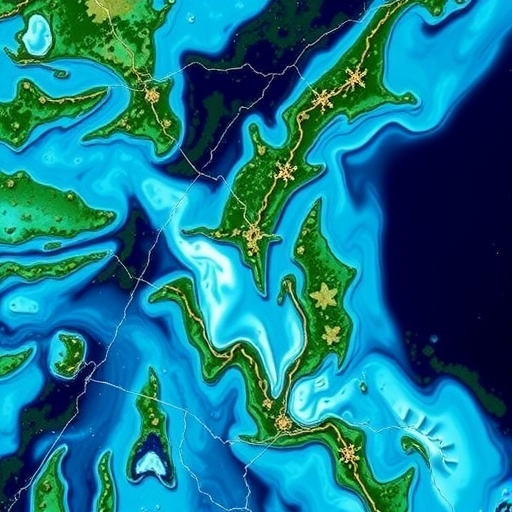In a groundbreaking study that sheds light on water resource management, researchers have tackled the challenge of assessing water resources in regions plagued by data scarcity. Conducted by a team led by prominent figures in environmental science, including Wang, C., Zhang, B., and Zhu, R., the research focuses on hydrological areas where information is typically sparse. The absence of comprehensive data makes effective water management difficult, particularly in regions vulnerable to climate change and human-induced stress. As water becomes an increasingly crucial asset in the face of global changes, understanding and optimizing its use is more important than ever.
Traditionally, water resource assessments rely heavily on extensive data collection from various hydrological parameters. However, many areas, particularly in developing regions or remote locales, lack sufficient infrastructure and investment to collect such data. This study innovatively circumvents these challenges by employing limited underwater survey points to extrapolate essential water resource information. By focusing on fewer data points, the researchers developed a methodology that can be applied in similar contexts, opening a new avenue for hydrological evaluations in resource-constrained scenarios.
The research methodology combines advanced data analytics with robust hydrological modeling to provide accurate assessments based on minimal input. Utilizing sophisticated algorithms, the team efficiently leveraged existing data to generate predictive models that simulate hydrological behavior. This is particularly relevant in establishing water availability and maintaining sustainability in areas with minimal existing information. The approach not only enhances data reliability but also significantly reduces the time and cost associated with traditional assessment methods.
Central to the study is the incorporation of satellite imagery and groundbreaking statistical techniques that allow for a comprehensive assessment without extensive ground data. Satellite technologies have revolutionized environmental monitoring, enabling researchers to track changes in land use, water bodies, and vegetation cover. By integrating these technologies into their methodology, the researchers established a scalable framework that can be implemented globally, even in the world’s most data-scarce environments.
The findings from this research have significant implications for local policymakers and water resource managers. As climate change continues to alter precipitation patterns and increase the frequency of droughts, areas previously thought to have abundant water resources may face severe shortages. The insights garnered from this study equip decision-makers with the necessary tools to take proactive measures in managing water resources, preparing for potential crises before they occur. It empowers them to make informed decisions that align with sustainable development goals.
Additionally, the study addresses the urgent need for community engagement in water management strategies. The researchers have emphasized collaboration with local communities, as those residing in areas with limited data often possess invaluable knowledge of local hydrology. Incorporating this local knowledge into the assessment process not only enhances the accuracy of predictions but also fosters a sense of ownership among community members, ensuring the long-term success of water management initiatives.
The researchers faced several challenges throughout their study, particularly in reconciling limited existing data with the varying hydrological conditions present in different regions. However, their innovative approach to utilizing statistical methods and modeling techniques surmounted these hurdles. This research sets a precedent for future studies that aim to reconcile gaps in data availability while maintaining accuracy and reliability in water assessments.
As the world grapples with the realities of climate change, water scarcity has become a pressing global concern. This research contributes significant knowledge to the discourse surrounding water management, highlighting the need for innovative solutions in the face of growing pressures. The implications of the study reach far beyond the immediate findings, suggesting a path forward for researchers seeking to enhance hydrological research in similar regions.
Importantly, the study’s findings underline the critical role of collaborative efforts among various stakeholders. By combining scientific expertise with local knowledge and satellite technology, a more holistic understanding of water resources can be achieved. This collaboration will pave the way for more inclusive and effective water management strategies that account for the diverse needs of communities while ensuring ecological sustainability.
Furthermore, the study opens the door for further exploration into the technological advancements that can aid in data collection and analysis in hydrological studies. As innovations continue to emerge in fields such as remote sensing and artificial intelligence, methodologies like the one suggested by Wang and colleagues can evolve and adapt to incorporate these tools, strengthening the accuracy and applicability of future assessments.
The implications of the work extend to global institutions and organizations working towards sustainable water management. As they strive to meet ambitious targets aligned with the United Nations Sustainable Development Goals, insights derived from this study could shape policies and funding strategies in areas most at risk. By addressing the water scarcity issues with practical, research-based solutions, communities worldwide can foster resilience against future environmental challenges.
In summation, this study represents a pivotal step in redefining how water resources are assessed in data-scarce regions. The melding of local knowledge, innovative methodologies, and technological advances reveals a pathway for more accurate and sustainable water resource management. As researchers build upon this foundation, we can expect a wave of progressive strategies to emerge, ultimately benefiting millions relying on these vital resources.
Through this research, Wang, C., Zhang, B., and Zhu, R. have not only contributed to the scientific community’s understanding of hydrology but have also paved the way for practical applications that can significantly improve water resource management practices globally. The innovative use of limited underwater survey points serves as an exemplary model for future investigations, demonstrating that even amidst data scarcity, effective strategies can emerge through creativity and collaboration.
Subject of Research: Water Resource Assessment in Data-Scarce Hydrological Regions
Article Title: Water resource assessment in data-scarce hydrological regions based on limited underwater survey points.
Article References:
Wang, C., Zhang, B., Zhu, R. et al. Water resource assessment in data-scarce hydrological regions based on limited underwater survey points. Environ Monit Assess 197, 1146 (2025). https://doi.org/10.1007/s10661-025-14600-7
Image Credits: AI Generated
DOI: 10.1007/s10661-025-14600-7
Keywords: Water Resource Management, Hydrology, Data Scarcity, Satellite Technology, Climate Change, Sustainable Development, Community Engagement, Innovative Methodologies.




